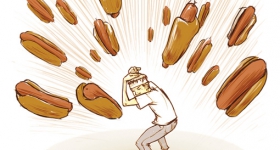MAE DE LA CALZADA was once the kind of person who would rather crank up her radio to drown out her squeaking brakes than bring her car to a mechanic.
Today, she's the proud owner of LadyParts Automotive Services in Redwood City, CA, and lives by the maxim that knowledge is power. "I'm basically a customer [who opened] my own shop," she says.
Tired of being ripped off by male mechanics who presume female ignorance about cars, Calzada opened LadyParts in September 2008 to empower women customers - as opposed to duping them into spending hundreds of dollars to replace their transmissions.
Calzada, a 30-year-old Filipina American, is a rare female face in an industry dominated by chest-thumping men. According to the Automotive Service Association, as few as 3 percent of its 8,000-member auto repair shops are women-owned.
But Jackie Miller, executive director of the Automotive Service Councils of California, thinks this is changing (albeit slowly) as auto repair becomes more computer-based and less "wrench-based" - and thus appealing to more women.
LadyParts Auto sits among a cluster of doughnut shops, nail salons, taquerias and Mexican grocery stores in Redwood City, a suburb south of San Francisco. Above the business hangs a yellow banner that reads "Experience the Difference!" Next door is a Meineke shop, a reminder of the forces Calzada is up against.
Walk inside LadyParts Auto and the wooden floors, wall fountain and plush beige couches make you feel as though you're about to get a facial treatment instead of a tuneup. The magazine rack is stacked with Marie Claire, Seventeen and Cosmopolitan. The mounted flat-screen TV is tuned to the E! channel. There is even a children's table with three small chairs.
The front counter, however, is like a typical auto shop in one respect: It is staffed by men. They are Archie Castro and Audrey Mesia, the other two owners of LadyParts Auto. There's also Victor Fleischer, the lead technician, lingering in the doorway.
Despite this male presence - Calzada had difficulty recruiting female mechanics, most of whom qualified as only junior technicians - the business distinctly targets women, as its name suggests.
Calzada specifically wanted to reach out to single mothers, many of who rely on cars to drive to work, to cart around children and to run daily errands. "When women's cars break down, lives break down," Calzada says.
Calzada was motivated to start the business largely by her own experience of getting bamboozled by an auto mechanic in 2006, when her car had been recalled. She brought in her car for repairs and wound up with a $1 ,000 bill.
"I paid money I didn't have," she says, recalling that she had to solicit her family's financial help.
When her mother had a similar auto repair experience two weeks later, Calzada got fed up.
At the time, Calzada was earning her business degree at the University of San Francisco. When her professor assigned students to come up with a service-oriented business proposal, Calzada knew right away she wanted to open an auto repair shop for women.
Upon completing her business degree, she enrolled in an auto repair class at Skyline College, putting in four hours a day, five days a week.
"My friend and I were the only girls there," Calzada recalls. In the class, she overheard the men commenting that female customers mean easy money. This made Calzada even more determined to start her own shop.
Today, Calzada is a certified shop manager. And although she leaves the main mechanical work to her male technicians at LadyParts Auto, she no longer feels intimidated. She even offers a car care clinic for women, teaching them to do basic inspections and how to respond to emergencies.
But even if her customers couldn't care less about what's under their hoods, Calzada wants them to feel that they can trust her, that they need not constantly worry about getting ripped off as she once did.
In her first few months of business, Calzada says her customer base has quadrupled. Surprisingly, about 40 percent are men.
Pia Sarkar is a Hyphen editor.









Comments